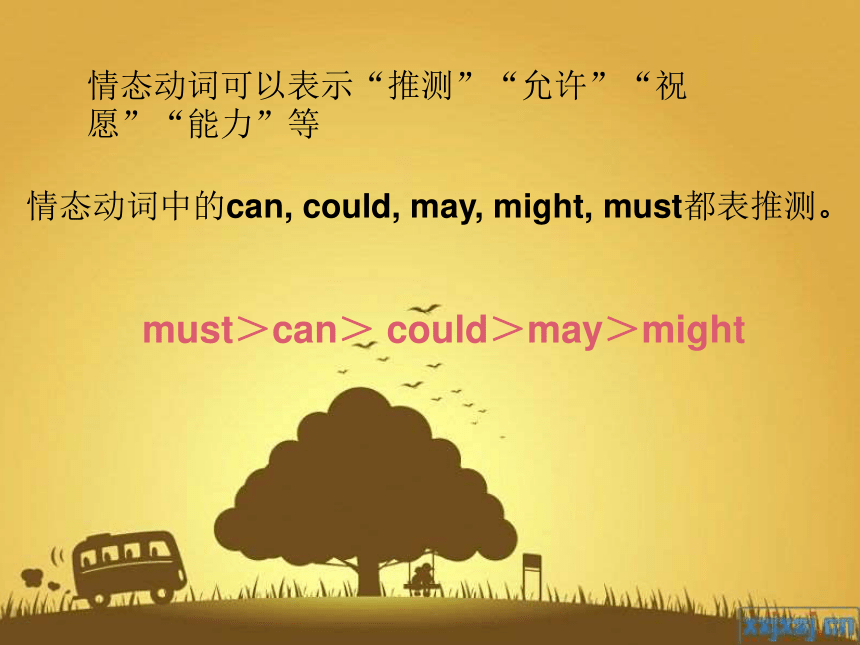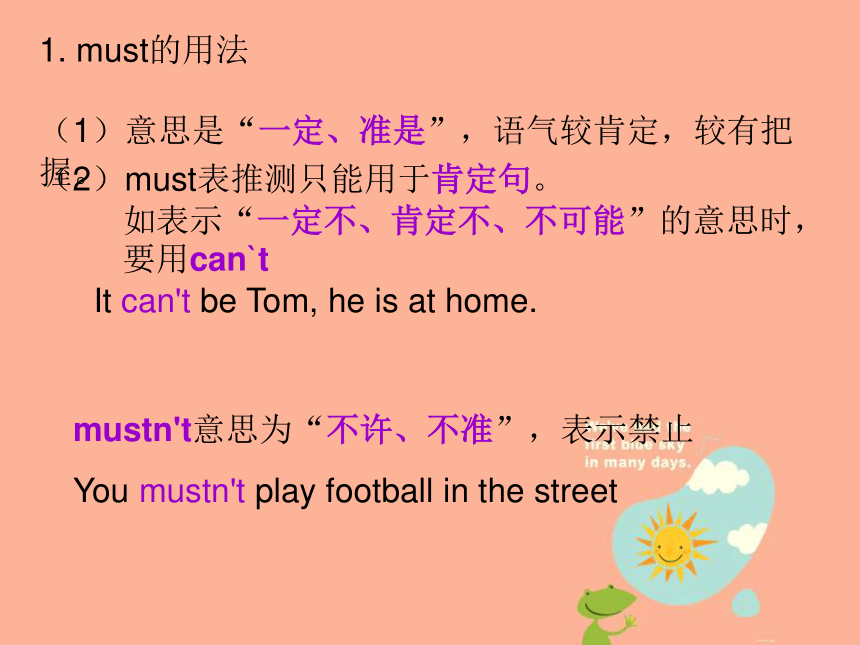情态动词用法专练
图片预览





文档简介
课件10张PPT。情态动词表示说话人的情绪,态度的动词情态动词无人称和数的变化,
情态动词后面跟的动词须用原形,
否定式构成是在情态动词后面加 "not"情态动词中的can, could, may, might, must都表推测。
must>can> could>may>might情态动词可以表示“推测”“允许”“祝愿”“能力”等1. must的用法
(1)意思是“一定、准是”,语气较肯定,较有把握。(2)must表推测只能用于肯定句。
如表示“一定不、肯定不、不可能”的意思时,
要用can`tYou mustn't play football in the streetmustn't意思为“不许、不准”,表示禁止It can't be Tom, he is at home.2.can / could用法
can / could表示的可能性比must小,
常用于否定句(一定不、肯定不、不可能)
和疑问句(会、可能)It can't be Tom, he is at home.
那一定不是Tom,他在家呢。
Can you help me?
你会帮助我吗?3.may, might用法
常用在肯定句中He may be very busy now.
他现在可能非常忙。maybe是副词,意思是“也许、可能”,作状语,常位于句首。 等于perhaps
Maybe she’ll come this afternoon.
她可能今天下午来。 may be,意思是“也许是、可能是”,may是情态动词,be是动词原形,作谓语。 maybe 和 may be 的区别1. –That man must be Sarah’s husband. --No, he_____ be her husband. She is still single. A. can’t B. mustn’t
C. may not D. might not
2. Peter _____come with us tonight, but he isn’t very sure. A. must B. may C. can D. will○○3. David, you _____play with the bottle,
you_______ break it. A. won’t; can’t B. mustn’t; may C. shouldn’t; must D. can’t; shouldn’t
4. Sue________ come together with us tonight, but she isn`t very sure yet. A. must B. can
C. may D. will
5.This ___be a woman’s book. It ____be a man’s.
A. can’t ; may B. can’t ; must
C. must not ; can D. can’t ; can
○○○6. John isn’t in the classroom. He ___ play soccer on the playground with Bob.
A. can B. must C. should D. can’t
7.-He___ be in the classroom, I think.
-No, he ___ be in the classroom. I saw him
go home a minute ago.
A.can; may not B. must; may not
C. may; can't D. may; mustn't
8.-Is Lena swimming in the pool?
-No, she ___ swim. She is afraid of water.
A. may not B. must not
C. can't D. needn't○○○9 -What do you think “upset” means?
- I’m not sure. It ___ mean “sad”.
A.may B. must C. can D. should
10.-You must be here at six tomorrow moring?
-Sorry. I ___ be here so early.
A.need B.may C.must D.can't○○表示可能性,出来可以用情态动词还可以用possible,probably,possiblypossible 形容词probably 副词 可能性大
possibly 副词 可能性小It's possible to do sth
It's possible that主语 + will probably/possibly + v. I'll probably/possibly see you tomorrow.
情态动词后面跟的动词须用原形,
否定式构成是在情态动词后面加 "not"情态动词中的can, could, may, might, must都表推测。
must>can> could>may>might情态动词可以表示“推测”“允许”“祝愿”“能力”等1. must的用法
(1)意思是“一定、准是”,语气较肯定,较有把握。(2)must表推测只能用于肯定句。
如表示“一定不、肯定不、不可能”的意思时,
要用can`tYou mustn't play football in the streetmustn't意思为“不许、不准”,表示禁止It can't be Tom, he is at home.2.can / could用法
can / could表示的可能性比must小,
常用于否定句(一定不、肯定不、不可能)
和疑问句(会、可能)It can't be Tom, he is at home.
那一定不是Tom,他在家呢。
Can you help me?
你会帮助我吗?3.may, might用法
常用在肯定句中He may be very busy now.
他现在可能非常忙。maybe是副词,意思是“也许、可能”,作状语,常位于句首。 等于perhaps
Maybe she’ll come this afternoon.
她可能今天下午来。 may be,意思是“也许是、可能是”,may是情态动词,be是动词原形,作谓语。 maybe 和 may be 的区别1. –That man must be Sarah’s husband. --No, he_____ be her husband. She is still single. A. can’t B. mustn’t
C. may not D. might not
2. Peter _____come with us tonight, but he isn’t very sure. A. must B. may C. can D. will○○3. David, you _____play with the bottle,
you_______ break it. A. won’t; can’t B. mustn’t; may C. shouldn’t; must D. can’t; shouldn’t
4. Sue________ come together with us tonight, but she isn`t very sure yet. A. must B. can
C. may D. will
5.This ___be a woman’s book. It ____be a man’s.
A. can’t ; may B. can’t ; must
C. must not ; can D. can’t ; can
○○○6. John isn’t in the classroom. He ___ play soccer on the playground with Bob.
A. can B. must C. should D. can’t
7.-He___ be in the classroom, I think.
-No, he ___ be in the classroom. I saw him
go home a minute ago.
A.can; may not B. must; may not
C. may; can't D. may; mustn't
8.-Is Lena swimming in the pool?
-No, she ___ swim. She is afraid of water.
A. may not B. must not
C. can't D. needn't○○○9 -What do you think “upset” means?
- I’m not sure. It ___ mean “sad”.
A.may B. must C. can D. should
10.-You must be here at six tomorrow moring?
-Sorry. I ___ be here so early.
A.need B.may C.must D.can't○○表示可能性,出来可以用情态动词还可以用possible,probably,possiblypossible 形容词probably 副词 可能性大
possibly 副词 可能性小It's possible to do sth
It's possible that主语 + will probably/possibly + v. I'll probably/possibly see you tomorrow.
同课章节目录
- 词法
- 名词
- 动词和动词短语
- 动词语态
- 动词时态
- 助动词和情态动词
- 非谓语动词
- 冠词
- 代词
- 数词和量词
- 形容词副词及其比较等级
- 介词和介词短语
- 连词和感叹词
- 构词法
- 相似、相近词比较
- 句法
- 陈述句
- 一般疑问句和否定疑问句
- 特殊疑问句及选择疑问句
- 反意疑问句
- 存在句(There be句型)
- 宾语从句
- 定语从句
- 状语从句
- 主谓一致问题
- 简单句
- 并列句
- 复合句
- 主谓一致
- 主、表语从句
- 名词性从句
- 直接引语和间接引语
- 虚拟语气
- 感叹句
- 强调句
- 倒装句
- 祈使句
- 句子的成分
- 句子的分类
- 题型专区
- 单项选择部分
- 易错题
- 完形填空
- 阅读理解
- 词汇练习
- 听说训练
- 句型转换
- 补全对话
- 短文改错
- 翻译
- 书面表达
- 任务型阅读
- 语法填空
- 其他资料
